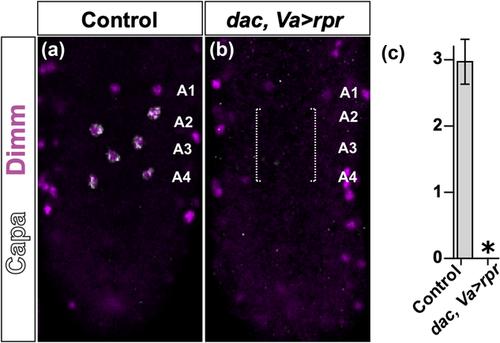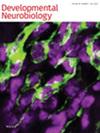Dachshund acts with Abdominal-B to trigger programmed cell death in the Drosophila central nervous system at the frontiers of Abd-B expression
IF 2.3
4区 医学
Q2 DEVELOPMENTAL BIOLOGY
引用次数: 1
Abstract
A striking feature of the nervous system pertains to the appearance of different neural cell subtypes at different axial levels. Studies in the Drosophila central nervous system reveal that one mechanism underlying such segmental differences pertains to the segment‐specific removal of cells by programmed cell death (PCD). One group of genes involved in segment‐specific PCD is the Hox homeotic genes. However, while segment‐specific PCD is highly precise, Hox gene expression is evident in gradients, raising the issue of how the Hox gene function is precisely gated to trigger PCD in specific segments at the outer limits of Hox expression. The Drosophila Va neurons are initially generated in all nerve cord segments but removed by PCD in posterior segments. Va PCD is triggered by the posteriorly expressed Hox gene Abdominal‐B (Abd‐B). However, Va PCD is highly reproducible despite exceedingly weak Abd‐B expression in the anterior frontiers of its expression. Here, we found that the transcriptional cofactor Dachshund supports Abd‐B‐mediated PCD in its anterior domain. In vivo bimolecular fluorescence complementation analysis lends support to the idea that the Dachshund/Abd‐B interplay may involve physical interactions. These findings provide an example of how combinatorial codes of transcription factors ensure precision in Hox‐mediated PCD in specific segments at the outer limits of Hox expression.

Dachshund与腹腔b在果蝇中枢神经系统Abd-B表达的前沿触发程序性细胞死亡
神经系统的一个显著特征与不同轴向水平上不同神经细胞亚型的出现有关。对果蝇中枢神经系统的研究表明,这种节段差异的一种机制与程序性细胞死亡(PCD)对细胞的节段特异性去除有关。参与片段特异性PCD的一组基因是Hox同源基因。然而,虽然片段特异性PCD是高度精确的,但Hox基因的表达在梯度中是明显的,这就提出了Hox基因功能如何被精确控制以在Hox表达的外部限制下触发特定片段的PCD的问题。果蝇Va神经元最初在所有神经索段产生,但在后段被PCD移除。Va PCD是由后表达的Hox基因abdominb (Abd-B)触发的。然而,尽管Abd-B在其表达的前沿表达极弱,但Va PCD具有高度可重复性。在这里,我们发现转录辅助因子Dachshund支持abd - b介导的PCD在其前域。体内双分子荧光互补分析支持了Dachshund/Abd-B相互作用可能涉及物理相互作用的观点。这些发现提供了一个例子,说明转录因子的组合编码如何确保Hox介导的PCD在Hox表达的外部限制的特定片段中的准确性。
本文章由计算机程序翻译,如有差异,请以英文原文为准。
求助全文
约1分钟内获得全文
求助全文
来源期刊

Developmental Neurobiology
生物-发育生物学
CiteScore
6.50
自引率
0.00%
发文量
45
审稿时长
4-8 weeks
期刊介绍:
Developmental Neurobiology (previously the Journal of Neurobiology ) publishes original research articles on development, regeneration, repair and plasticity of the nervous system and on the ontogeny of behavior. High quality contributions in these areas are solicited, with an emphasis on experimental as opposed to purely descriptive work. The Journal also will consider manuscripts reporting novel approaches and techniques for the study of the development of the nervous system as well as occasional special issues on topics of significant current interest. We welcome suggestions on possible topics from our readers.
 求助内容:
求助内容: 应助结果提醒方式:
应助结果提醒方式:


